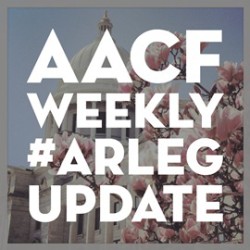
HEALTH: Next week, the bill to allow local municipalities to determine the fluoride levels of their water system is expected to be presented to the Senate Public Health, Welfare, and Labor Committee. This bill, HB1355, establishes a maximum not to exceed fluoride levels set by the Department of Health. It does not set a minimum standard for local water systems, which reverses a law passed in 2011 requiring water systems serving a certain number of people to maintain a fluoride level set by the Department of Health to prevent tooth decay.
There’s news on the Private Option front. Although legislature Act 46 passed early in session to keep coverage in place through 2016 and create a Health Care Reform Task Force to make recommendations for the future, a number of bills have continued to be filed that affect the Private Option. This week HB1363, which requires all Private Option enrollees to be notified that the current coverage program will end on December 31, 2016, passed the House. This bill would require that DHS inform people of the end date of the program upon enrollment and at renewal.
Today, HB1492 was filed. It would repeal legislation that created the nonprofit state-based marketplace. Currently, people can shop for and purchase private insurance plans through the federal partnership marketplace, which will soon transition to a state run nonprofit organization. Pending a Supreme Court decision, in the future federal law could only allow state-based marketplaces to offer tax credits to help reduce the costs of monthly insurance premiums. Without a state-based marketplace Arkansans would not be eligible to receive these tax credits.
EDUCATION: HB1263 to repeal mandatory school consolidation passed out of the House Education Committee this week. Currently when districts have fewer than 350 students they must be consolidated or voluntarily annexed into another district. The bill would allow districts with fewer than 350 students to continue if they are not in academic or fiscal distress, or in violation of accreditation standards.
Efforts to find funding for pre-K continue to progress. Bi-partisan groups of lawmakers are in discussions to try to identify a funding source. If the efforts are successful, the line item for pre-K funding in SB174 (the education department appropriation) should be increased by amendment. While no new bills can be filed after March 9, (no appropriation bills after March 2), bills can be amended through the end of the session.
HB1485 was filed yesterday to create a Legislative Taskforce to review special education policies and practices in the schools. The Taskforce will consist of legislators and shareholders including parents of special education children.
JUVENILE JUSTICE: HB1197 The Fair Sentencing for Minors Act is being amended and will be back before the House Judiciary Committee again for a vote next week. A similar bill is expected to also be introduced in the Senate to increase chances of passage before the end of the session. It will eliminate life without parole for minors under the age of 18 years and replace that with a potential sentence of life with possibility of parole after serving 28 years. Children can and do commit serious crimes. When they do, the justice system must hold them accountable. But children aren’t the same as adults. Their brain development, their understanding of long-term consequences, their impulse control, their susceptibility to peer pressure – all of these factors make children who commit crimes different from adults. So, the punishment shouldn’t be the same for a child as it is for an adult. There are currently 113 inmates at the Arkansas Department of Correction serving life without parole for a crime they committed as minors. Hopefully the bill will retain its provision to make the change in law retroactive so that those inmates will be considered eligible for parole after serving more than 28 years.
Here are the rest of the bills we’re watching:
